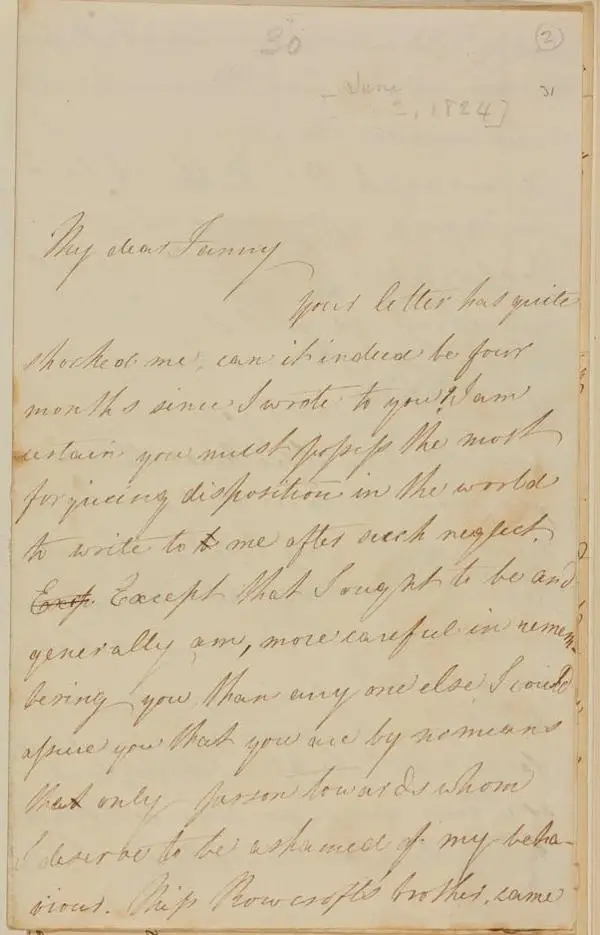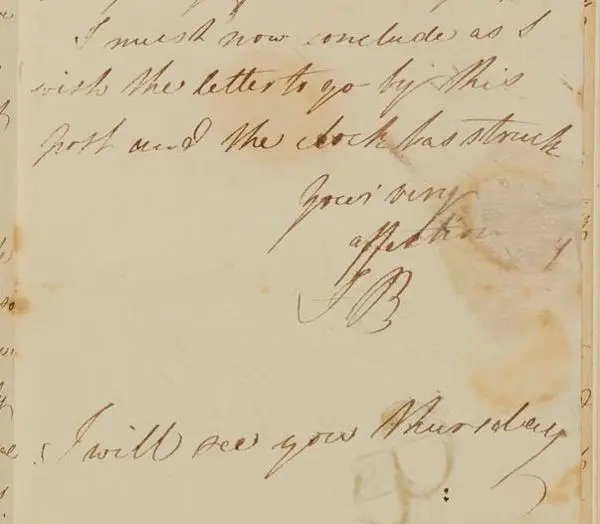Fanny Brawne’s letter to Fanny Keats, Wednesday 2 June 1824
Before he parted from Fanny Brawne and left Wentworth Place, Keats asked her to write to his sister, Fanny Keats. They began a correspondence of 31 letters over a four-year period. Keats House are publishing the letters from Fanny Brawne to Fanny Keats online on the 200th anniversary of them being written.
This project reveals the lives of two women living in London in the 1820s. See ‘Related links’ to read other letters and an article on how these came to be in the Keats House collection.
The letter
In this short letter, replying to one she had received from Fanny Keats, Fanny Brawne is shocked to discover that she had not written to her for four months, and she reveals that she is also shocked by her behaviour towards other people. The rest of the letter informs Fanny Keats about various acquaintances – Miss Rowcroft, who was still in Peru, Mrs Dilke, who was displeased with her, and Mr Lancaster, who had recently visited the Brawnes – and she hopes to see Fanny next Thursday. She makes a mistake about the date of Fanny Keats’s birthday, but by the time of her next, and last, letter, written on 16 June, she had realized her error.

My dear Fanny
Your letter has quite shocked me, can it indeed be four months since I wrote to you? I am certain you must possess the most forgiving disposition in the world to write to me after such neglect. Except that I ought to be and generally am, more careful in remembering you, than any one else, I could assure you that you are by no means the only person towards whom I deserve to be ashamed of my behaviour. Miss Rowcroft’s brother, came here a few weeks ago, entirely to give me news of her and to beg of me to write to her immediately which I have not yet done; as to Mrs Dilke I believe she is quite affronted with me. Don’t suppose that I should not have shame enough to keep these things, only you seem to suspect that while I neglect you I may be more attentive elsewhere, this is so far from the case, that you have been untill very lately the only person excepted from my general inattention. Lancaster was at our house last wednesday and promised to call here on sunday for some books for you, but I suppose he forgot it as I have never seen him, so I shall bring them on thursday. I have not forgotten that the 18th of June is your birthday. I am invited to a party for that night.
I must now conclude as I wish the letter to go by this post and the clock has struck
Yours very affectionately
F B
I will see you thursday
Postmark: Hampstead, June 2nd. 1824.
Address: Miss Keats / 4 Pancras Lane / Cheapside

Further information
Fanny Keats’s 21st birthday
Fanny Keats came of age on the 3 June 1824, the day after this letter was written. Fred Edgcumbe, the editor of the letters, wrote: ‘Fanny Keats was born on June 3rd, 1803, and became of age the day she received this letter. It is strange that Fanny Brawne made this error about the date of her birthday (June 18th), but apparently she became aware of her mistake before she wrote the next letter (the last), as she makes no mention of the birthday and clearly regards Fanny as of age.’
George Keats’s letter to Fanny Keats, 28 April 1824
Fanny Brawne’s letter is a reply to one she had received from Fanny Keats. But before Fanny Keats wrote to Fanny Brawne, she may have received a letter from her brother George in Louisville, Kentucky, which he began writing on 28 April and probably finished in May. George opened his letter with a short quotation from his brother John's poem ‘Endymion’: '’Tis now the early budders are just new / And spread in Mazes of the youngest hue / About old Forests'.
Here is an extract from the letter. He mentions Fanny Brawne, the ‘persons I very much respect’ were probably the Reynolds family, and he recommends that Fanny Keats consult Mrs Dilke about moving away from her guardians the Abbeys when she comes of age. George was at this time still convinced that Richard Abbey had her best interests in mind. He and his sister were yet to discover that Abbey had mismanaged their affairs.
‘You may fairly accuse me for not writing so frequently as I ought to have done, but I am persuaded you have not received several letters that I have sent, I hope in future that our correspondence will be attended with better fortune, I regret Miss Brawne should have been in the way of your writing to me, that letter had it come to hand would have relieved me from many unpleasant feelings about you. Knowing John's affection for that young Lady I feel very much disposed to like her, altho' I was informed by persons I very much respect that she was an artful bad hearted Girl, all I saw to object to in her was an appearance of want of affection for her Sister and respect for her Mother. I sincerely hope she is not connected in the change you contemplate “in your present mode of life for one more congenial to your age.” If you have occasion to consult any one on so delicate a step as a change of life, I presume you mean a change of residence, let me recommend Mrs Dilke to you, she has good sense and a large fund of disinterested good nature. […] I am fully persuaded from the affectionate manner in which Mr Abbey mentions you that he is deeply interested in your happiness, and knowing him to be a straight-forward, candid man, I feel easy while you are under his protection, and hope you will never leave it untill you change your name or live with me. […] One thing is most positive, do not intrust any one but Abbey with your property, nor lay yourself under material obligations, or you will soon become the dupe of the designing and crafty […]'
George’s letter also reveals that Fanny Keats had been learning to play the harp.
You can read George’s letter at the Internet Archive.